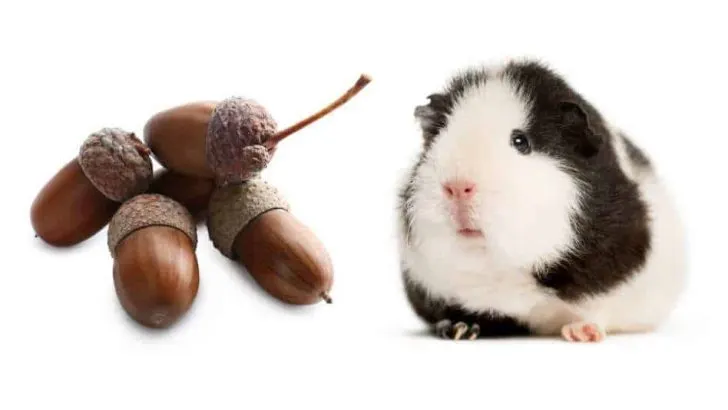If you’ve ever asked yourself: “can guinea pigs eat acorns?”, that’s a perfectly valid question. Acorns look like a perfect nibbling object for your little piggies teeth!
Unfortunately for your little piggies, they shouldn’t eat them. In order to better understand why acorns are not suitable for your pet, you need to understand the nutritional values of this food, and which ingredients in this food can be potentially dangerous if consumed by guinea pigs.
But, you are not to worry. There are a lot of things your pet can eat instead of acorns. As you all know guinea pig diet revolves around fibers and not protein or carbohydrates, and that’s precisely the reason why those two should be avoided in other foods that your piggy maybe want to get its hands on.
If you’re wondering which are those foods that are safe and recommended for my guinea pig, you’re in luck. Much of these foods are easily accessible, so to learn more about them, I suggest you keep reading!
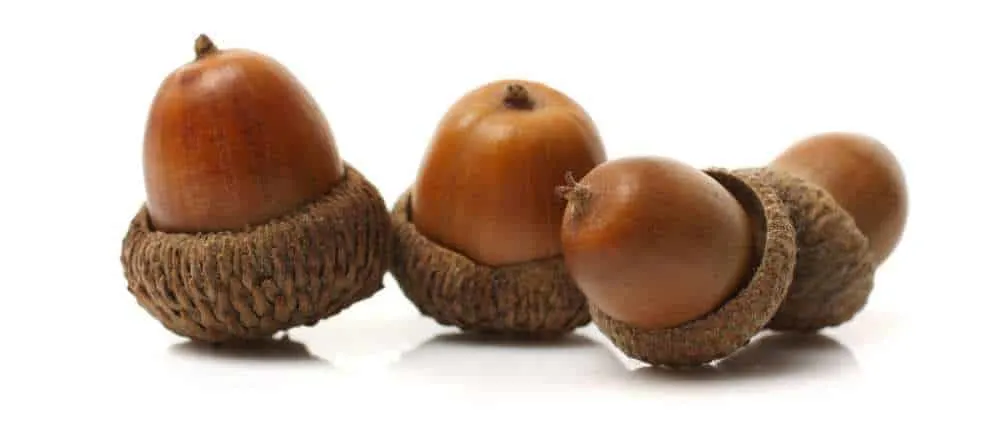
Why Can’t Guinea Pigs Eat Acorns And Other Types Of Nuts?
Even though your guinea pig can eat nuts, it’s best for both you and them not to feed them any. Here’s why – acorn is a fruity nut which means it’s carbohydrate-rich. Most of these foods share similar characteristics and should be avoided overall.
You sometimes may give your guinea pig some acorns, but you should avoid them altogether in most situations. You should focus more on a diet that consists of foods that are high in fiber, moderate in protein, and low in carbohydrates.
Because acorns are highly nutritious (very high in protein, fats, fiber, and other nutrients), they are not good for your little piggie in those amounts.
To bring you closer to my claim, here’s a little list of some nutritional values that are found in acorns:
| Calories | 144 |
| Protein | 2 Grams |
| Fat | 9 Grams |
| Carbs | 15 Grams |
| Fiber | 4 Grams |
| Vitamin A | 44% |
| Vitamin E | 20% |
| Iron | 19% |
| Manganese | 19% |
| Potassium | 12% |
| Vitamin B6 | 10% |
| Folate | 8% |
It should also be noted that because acorns are high in unsaturated fats, they can pose some problems when talking about your guinea pigs’ digestive system.
Furthermore, nuts are high in calories – which could negatively impact your guinea pig’s weight. Meaning that if they get overfed, they can affect weight shifts, exhaustion, and several other health issues.
Feeding your guinea pig any type of nuts will quickly offset their healthy bacteria’s fragile balance and will give them a problem with their digestive tract. And it may also give your pets big problems if not properly taken care of.

How Much Food Should Guinea Pigs Eat?
Even though guinea pigs are small animals, it’s not a problem for them to eat throughout the entire day. Because they eat a lot of food, you may wonder – do they get sick, and do they feel as if they are full?
In fact, guinea pigs feel when they are full, but it is not possible for them to throw up.
When your piggy eats too much food, it just waits for the food to pass through its system. They need to eat throughout the entire day to make sure that their body functions properly.
For instance, here you have a small example of the quantity of food that should be given to your guinea pigs:
| Types Of Food For Guinea Pigs | Quantity Of Food That Should Be Given |
|---|---|
| Hay (mostly Timothy) | You should provide your guinea pig with unlimited amount of this food |
| Pellets | One eight of a cup is a recommended serving size for most guinea pigs |
| Leafy Greens (lettuce, spinach and more) | One half a cup for every pound of their body weight |
| More vegetables (bell peppers, squash, tomatoes, etc) | Occasionally, as a treat |
| Fruits ( orange, strawberries, apples, etc) | Once a week, as a treat |
And of course, you will need to make sure that the food you give your guinea pigs is very high in quality for their health.
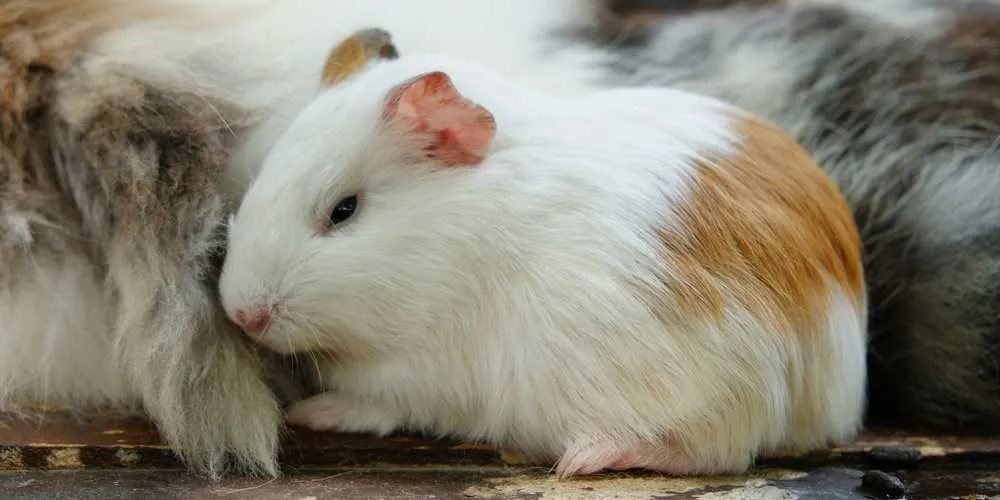
What Can Guinea Pigs Eat?
As you may or may not know guinea pigs love to eat different sorts of fruits and vegetables. Some that I recommend are tomatoes, romanian lettuce, peas, broccoli seeds, and so on. You should feed your piggies foods that are rich in vitamin C because they do not produce their own vitamin C like humans.
You should be careful not to overfeed them because they’re small animals that do not eat a lot. But you need to prepare a healthy amount of quality hay because it helps them with their digestion and it limits the growth of their teeth.
Timothy hay is a great source of fiber that helps your little piggie with their digestion. It also helps with their dental health, because guinea pigs teeth grow throughout their lives. It is good to constantly feed them some hay to wear down the growth of their teeth.
If you leave them without anything to do they may become bored or even depressed, which may eventually lead to some health problems. So always make sure that you have some fresh cut of any type of hay to keep your guinea pigs occupied all the time.
You may have seen somewhere that some store-made treats can be used as food for guinea pigs. But do they have any nutritional value and the needed calories for your pets?
They most certainly do not! They are high in artificial sweeteners such as fructose or sucrose, so there is no need for them.
Your little pets will be perfectly happy with some natural treats. You may use some high-quality pellets or maybe even fruits and vegetable treats. For instance, use some rolled oats and mix them with pig pellets. Or make any mix that you may find fun and nutritional.
Learn More: The Complete Guide For Guinea Pigs Diet
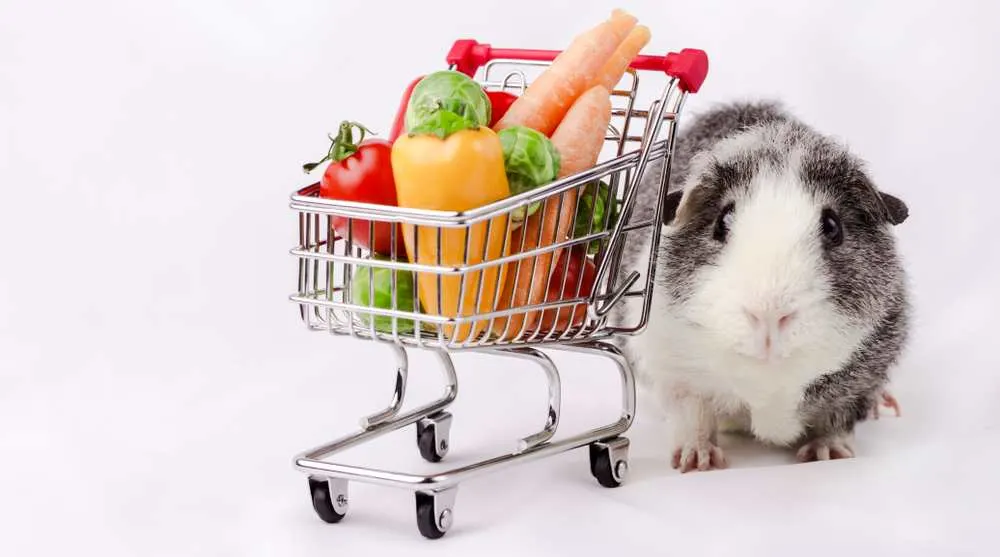
What Not To Let Your Guinea Pig Eat?
Even though guinea pigs enjoy a variety of flavors and a lot of fruits and vegetables, there are some foods that you should not feed them. You should avoid them because they are low in nutrients or can give your pets gas and other tummy troubles. But not all of them are poisonous for your guinea pig.
I have given you a small list of some good foods that your guinea pig may eat. Now here we have another one that has some of the food that your little piggie should not eat:
- Onions
- Garlic
- Cholocate
- Avocados
- Peanut butter
- Mineral blocks or salt licks. They can cause mineral buildup that can turn into bladder stones
- Seeds with kernels that guinea pigs can choke on
- Animal byproducts
- Broccoli or other veggies that can be unhealthy and cause gas
- Iceberg lettuce – it has no nutritional values and it is high in water content
You should also never offer your guinea pig any plants, flowers, or grass from your yard or garden as they may contain pesticides or other hazards. Many houseplants are also toxic, so always supervise your little pet when they are out of their habitat.
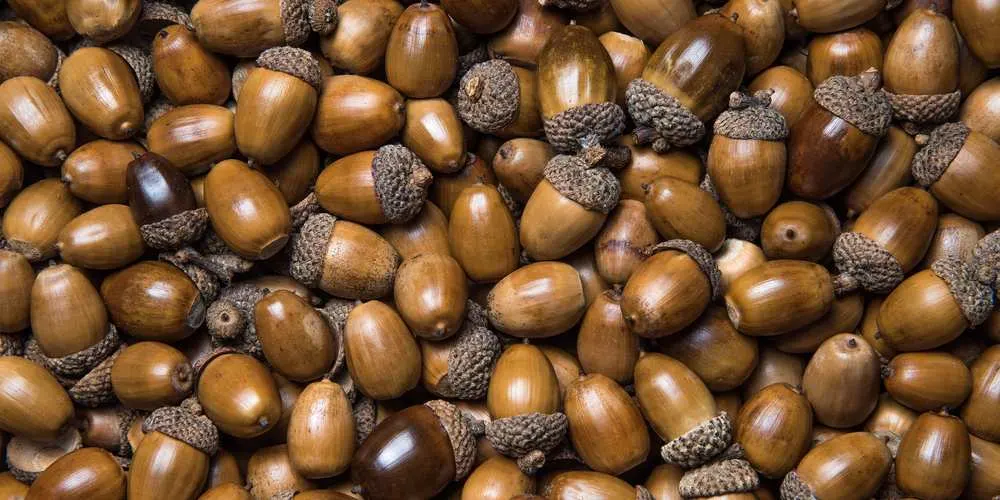
Conclusion
Are you still wondering if guinea pigs can eat acorns?
It’s safe to say that they can not! But even if your guinea pigs have eaten some acorns, do not be alarmed. Just make sure that you have an unlimited amount of fresh and sweet-smelling hay, a smaller quantity of pellets fortified with Vitamin C.
Always have fresh fruits and vegetables, some nice treats by your side because they are also very important for your guinea pigs health. But there is no need to feed them treats more than two times a week.
So, in order to keep your guinea pigs happy and healthy, make sure they avoid acorns and choose some healthy alternatives that’ll be useful for your pet’s overall health!

